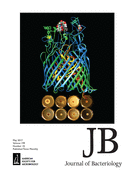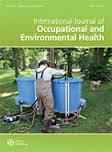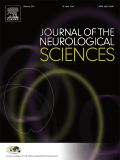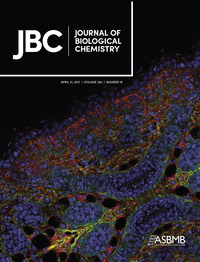 The week at Retraction Watch featured a look at how long journals take to respond to retraction requests, and news of a $10 million settlement for research misconduct allegations. Here’s what was happening elsewhere: Continue reading Weekend reads: New calls for retraction; more on fake peer review; how long does peer review take?
The week at Retraction Watch featured a look at how long journals take to respond to retraction requests, and news of a $10 million settlement for research misconduct allegations. Here’s what was happening elsewhere: Continue reading Weekend reads: New calls for retraction; more on fake peer review; how long does peer review take?
Month: April 2017
Former rising star found guilty of misconduct issues 2nd retraction
 A once-lauded researcher in the field of infectious disease — who has since been found guilty of misconduct — has retracted a second paper.
A once-lauded researcher in the field of infectious disease — who has since been found guilty of misconduct — has retracted a second paper.
Last year, the University of Dundee in Scotland investigated and ultimately concluded that Robert Ryan — whose work focused on infections that can be deadly in people with lung diseases such as cystic fibrosis — had committed “serious research misconduct,” affecting multiple publications. After appealing the decision, Ryan resigned.
We covered his first retraction earlier this month, which cited multiple instances of image duplication. Now Ryan has retracted his second paper, published in 2011 in Journal of Bacteriology, also due to image problems.
Here’s the retraction notice: Continue reading Former rising star found guilty of misconduct issues 2nd retraction
$200M research misconduct case against Duke moving forward, as judge denies motion to dismiss
 A Federal U.S. court in North Carolina has denied a motion to dismiss a major lawsuit filed against Duke University and two former employees, allowing the case to go forward.
A Federal U.S. court in North Carolina has denied a motion to dismiss a major lawsuit filed against Duke University and two former employees, allowing the case to go forward.
Last year, the U.S. District Court of the Western District of Virginia unsealed a whistleblower lawsuit filed by another former employee at Duke against the university, a biologist and her former supervisor, alleging they included fraudulent data in applications and reports involving more than 60 grants. The total amount: $200 million. If successful, Duke may have to refund three times the amount of allegedly ill-gotten gains, and the whistleblower could himself receive millions.
The researcher, Erin Potts-Kant, her supervisor William Michael Foster, and Duke all filed motions to dismiss; this week, that motion was denied.
Harvard teaching hospital to pay $10 million to settle research misconduct allegations

Brigham and Women’s Hospital and its parent healthcare network have agreed to pay $10 million to the U.S. government to resolve allegations it fraudulently obtained federal funding.
The case, which involves three former Harvard stem cell researchers, dates back several years. In 2014, Circulation retracted a paper by Piero Anversa, Annarosa Leri, and Jan Kajstura, among others, amidst a university investigation into misconduct allegations. Anversa and Leri — whose lab was described as filled with “fear” by one former research fellow — later sued the hospital for notifying journals of that investigation. They lost.
In the agreement announced today by the Department of Justice (DOJ), Partners Healthcare and Brigham and Women’s Hospital have agreed to pay the government $10 million to settle allegations that the researchers fraudulently obtained funding from the National Institutes of Health:
Public health journal’s editorial board tells publisher they have “grave concerns” over new editor
 First, an occupational health journal appointed a new editor with industry ties without consulting the editorial board. Then, with no explanation, it withdrew a paper by the previous editor that was critical of corporate-sponsored research — again, without consulting the editorial board.
First, an occupational health journal appointed a new editor with industry ties without consulting the editorial board. Then, with no explanation, it withdrew a paper by the previous editor that was critical of corporate-sponsored research — again, without consulting the editorial board.
At that point, they’d had enough.
Yesterday, the editorial board of the International Journal of Occupational and Environmental Health sent a letter to the publisher, Taylor & Francis, expressing their “grave concerns” over the future of the journal, and its recent actions.
As part of the letter — signed by 30 past and present editorial members and the founding editor — they write:
A university asked for numerous retractions. Eight months later, three journals have done nothing.

When journals learn papers are problematic, how long does it take them to act?
We recently had a chance to find out as part of our continuing coverage of the case of Anil Jaiswal at the University of Maryland, who’s retracted 15 papers (including two new ones we recently identified), and has transitioned out of cancer research. Here’s what happened.
As part of a public records request related to the investigation, we received letters that the University of Maryland sent to 11 journals regarding 26 “compromised” papers co-authored by Jaiswal, four of which had been retracted by the time of the letter. The letters were dated between August and September 2016 (and one in February) — although, in some cases, the journals told us they received the letter later. Since that date, three journals have retracted nine papers and corrected another, waiting between four and six months to take action. One journal published an editorial note of concern within approximately two months after the university letter.
And six journals have not taken any public action.
A troubling new way to evade plagiarism detection software. (And how to tell if it’s been used.)

Recently, at the end of a tutorial, a student asked Ann Rogerson a question she’d never heard before: Was it okay to use paraphrasing tools to write up assignments? Rogerson, a senior lecturer in the faculty of business at the University of Wollongong in Australia, was stumped — she’d never heard of these tools before.
It turns out, the student had learned of the tool from another student. For an assignment, the student had taken wording from a journal article and run it through a free online tool that automatically paraphrases text, so it evades plagiarism detection software.
Immediately, Rogerson remembered wording from a previous student submission that had always bugged her — in an assignment about employee performance reviews, the student had written awkward phrases such as “constructive employee execution” and “worker execution audits.” A lightbulb went off for Rogerson.
She immediately went to her computer, looked up the tools on Google, and easily found one. She typed in “employee performance reviews,” and the tool spit out “representative execution surveys.”
A shadow was cast on a bone researcher’s work. What are journals doing about his papers?
 Last year, a researcher cast doubt on a bone scientist’s clinical trials, suggesting some of the findings may not be legitimate. So what’s happened since?
Last year, a researcher cast doubt on a bone scientist’s clinical trials, suggesting some of the findings may not be legitimate. So what’s happened since?
Since 2015, journals have retracted 14 papers by bone researcher Yoshihiro Sato, based at Mitate Hospital in Japan, for issues ranging from self-plagiarism, to problems with data, to including co-authors without their consent. (We covered the latest two retractions this week.) Last year’s analysis identified patterns in more than 30 of Sato’s clinical trials that suggest systematic problems with the results. (Sato has defended his research.)
With doubts cast on Sato’s body of work, we contacted the journals that have published his papers involving human trials, to see if any taken another look at Sato’s work; several responded. While most believe there is little reason to take further action at this time, some told us they are investigating.
Continue reading A shadow was cast on a bone researcher’s work. What are journals doing about his papers?
Harvard diabetes researcher retracts third paper
 A prominent diabetes researcher based at Harvard Medical School has retracted a third paper, citing manipulation of multiple figures.
A prominent diabetes researcher based at Harvard Medical School has retracted a third paper, citing manipulation of multiple figures.
Late last year, Carl Ronald Kahn—also chief academic officer at Joslin Diabetes Center—retracted two papers for similar reasons. In November, Kahn pulled a 2005 paper from The Journal of Clinical Investigation (JCI) and a month later, he retracted a 2003 paper from The Journal of Biological Chemistry (JBC), both times citing duplications that the authors said were introduced while assembling the figures.
Last month, Kahn retracted his third paper, also published in JBC in 2003, because the authors omitted data when constructing the images. Still, the authors remain confident in their findings, given that data from other labs “have confirmed and extended the conclusions of the manuscript.”
Here’s the retraction notice: Continue reading Harvard diabetes researcher retracts third paper
“Existence and motive to retaliate:” Judge hands victory to whistleblower scientist
 A Michigan researcher whose accusations of misconduct against his former employers led to years of legal battles has won a judge’s ruling that could earn him one of his jobs back.
A Michigan researcher whose accusations of misconduct against his former employers led to years of legal battles has won a judge’s ruling that could earn him one of his jobs back.
Over the past few years, Christian Kreipke has been embroiled in legal battles with the Detroit VA Medical Center and Wayne State University, where he held a dual appointment. In 2010, Kreipke accused Wayne State of misusing federal funds — then was fired in 2012 when the university brought its own case of research misconduct against him. In 2013, the VA followed suit. In 2014, Kreipke lost a whistleblower lawsuit against the university. As a result of the Wayne State investigation, journals have retracted five of his papers, some as recently as last month.
In March, a judge ordered the Department of Veterans Affairs to reinstate Kreipke’s position, among other requests. Continue reading “Existence and motive to retaliate:” Judge hands victory to whistleblower scientist